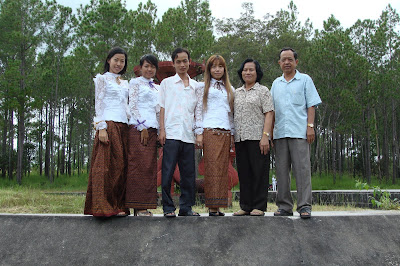
This year, the Jessup Competition will celebrate its 50th Anniversary and to mark this momentous occasion, the ILSA Spring Conference will focus on the contributions of the Competition to international law. The conference is titled 50 Years of the Jessup: Reflections on the Past, Visions of the Future. Distinguished speakers will discuss international law issues raised in past Jessup problems, tracing the history of these issues from the time the problem was crafted to the present, with a focus on how the law will develop in the future. Discussion topics will include terrorism, post-conflict obligations of states, indigenous peoples’ rights, and international environmental law.
"50 Years of the Jessup: Reflections on the Past, Visions of the Future"
| Thursday, March 26 |
| 8:30am - 9:00am | Registration and Continental Breakfast |
| 9:00am - 10:30am | The Responsibility to Protect |
| This year's Jessup Problem focuses on the legal issues that arise when members of the international community, either collectively through the United Nations, or individually through unilateral action, intervene in the affairs of a state on humanitarian grounds. Among the many legal issues addressed in is the responsibility to protect, an emerging yet important international legal norm that requires the cooperation of states to solve crises that threaten the security and well-being of the world’s people. Speakers will discuss R2P and its possible application to ongoing humanitarian crises around the globe. |
| 10:45am - 12:15pm | Multinational Corporations in the International Sphere |
| The 2006 Jessup Problem explored the complicated relationship between states and private companies and the difficulty of subjecting private conduct to the constraints of international law. Multinational corporations have an increasing presence in the international sphere, thus raising a host of legal issues including: the concept of “multinational enterprise” under international law; state responsibility for private actors; issues of forced labor and worker’s rights; and the rights of indigenous communities to land and other resources, or compensation for the deprivation thereof. Panelists will explore these and related issues. |
| 12:15pm –1:15pm | Lunch Break |
| 1:30pm – 3:00pm | Post-Conflict Obligations of States |
| Rape as war tactic and sexual slavery have been a part several major recent conflicts, including those in Yugoslavia, Rwanda, and now in Sudan and Congo. This panel will discuss the 2003 Jessup Problem which focused on violence against women during and after violent conflict. The panel will answer the following questions: What legal consequences exist for the use of systematic rape as a war tactic? After a conflict ends, if the winning party grants amnesty to the rapists, is that amnesty upheld under international law? What are the legal consequences when a country exploits vulnerable communities by engaging in human trafficking and sexual slavery? What responsibilities do states have to prevent, discourage, or punish systematic violence against women during and after violent conflict? |
| 3:15pm – 4:30pm | Terrorism and International Law |
| The 1996 Jessup Problem concerned the world-wide problem of terrorism. Among other acts of terrorism, 1996 witnessed a truck bombing in Saudi Arabia that killed 19 U.S. servicemen and wounded 300 others; a series of suicide bombings in Tel Aviv that derailed the Middle East peace process and led to a change of government in Israel; and in Peru terrorists seized the residence of the Japanese Ambassador, taking hundreds hostage. This panel will discuss how, both historically and recently, the international community has responded to terrorism though international and regional agreements, the UN system, and in customary law. |
| 4:45pm | ILSA Congress |
| All ILSA Chapter members are asked to attend the ILSA Spring Congress, the bi-annual meeting of ILSA Chapters. At Spring Congress, ILSA members will hold elections for the 2009-2010 Student Officers, discuss the year's activities, and plan for the future of the organization. |
| 9:30pm | Jessup Go-National Dress Ball |
| All Spring Conference attendees are invited to the Go National Dress Ball. Everyone is encouraged to come dressed in National costume or other creative attire. The Go National Ball will be held in the Ballroom at the Fairmont Hotel. |
| |
| Friday, March 27 |
| 8:30am - 9:00am | Registration and Continental Breakfast |
| 9:00am - 10:30am | A Non-Nuclear Future? |
| It is estimated that in 1985, at the height of the Cold War, there were 65,000 nuclear weapons in the world. The international community was rightly worried about the increasing number of states developing or acquiring nuclear weapons, and turned to international law as a means of controlling nuclear threats. ILSA followed this pursuit, and the 1985 Jessup Problem raised a question that many others were asking: Is the threat or use of nuclear weapons in any circumstances permitted under international law? |
| Many historical and legal developments affected the path towards a non-nuclear future. The Cold War ended, international non-proliferation agreements were entered into, nuclear stockpiles decreased, and the ICJ issued an advisory opinion stating that the use of nuclear weapons would generally be contrary to the principles and rules of international humanitarian law. But no comprehensive or universal prohibition on the use of nuclear weapons exists in international law, and nuclear terrorism is now a concern of many states. This panel will approach issues of nuclear weapons and disarmament through a discussion of these historical developments and emerging concerns, focusing upon the history of nuclear arms control treaties, global non-proliferation regimes, efforts to reduce and marginalize nuclear weapons, and the per se illegality of nuclear weapons. |
| 10:45am – 12:15pm | Transnational Pollution and International Environmental Law |
| The focus of the 1975 Jessup Problem was transnational pollution. It is often said that pollution knows no national boundaries; and with the movement of pollutants from a source in one state so as to injure individuals and property in a neighboring state, the following international legal issue was raised: What is the responsibility of a state for activities (both public and private) in its territory which cause injury to the environment of its neighbor? Additionally, how should policy makers balance the desire for environmental protection with the need for economic growth? |
| The authors of the 1975 Jessup Problem stated that issues of transnational pollution were then “still in an embryonic stage.” The same cannot be said today. Worldwide concern for the environment is at an all-time high, and climate change is one of the most urgent issues facing world leaders. This panel will address current environmental law and policy with a focus on transnational pollution and efforts to balance economic growth and industrial development with the need for environmental protection and preservation. |
| 12:30pm – 2:00pm | Pathways to Careers in International Law Luncheon |
| A distinguished panel of scholars and practitioners will share their experiences and explore employment opportunities in international law with students and young attorneys. During the panel, students will learn about international internship opportunities, how to network with legal experts from around the world, how to become active in international organizations and societies, and how to develop legal and interpersonal skills. |
| 2:00pm – 3:30pm | Outer Space Law: The Next Legal Frontier |
| Space law was a relatively new and fast-developing field of law when it was chosen as the topic for the 1980 Jessup Problem. The United Nations General Assembly had recently opened for signature the Agreement Governing the Activities of States on the Moon and Other Celestial Bodies and the world was still in the midst of the Cold War. The world has changed greatly since 1980, but the area of Space Law remains a novel and growing field. In the past year, Iran launched its first domestically made satellite and China completed its third manned space mission. As nations that are new to the field of space exploration vigorously develop their space programs, what international law will apply? This panel will discuss the development, current influence, and future of space law. |
| 3:45pm – 5:00pm | International Legal Problems Involved in the Exploitation of the Oceans |
| The 1973 and 1974 Jessup Problems concerned the law of the sea. At this time, many states were in conflict over the validity of extensions of jurisdiction over underwater resources; the Fisheries Jurisdiction case (Germany v. Iceland) was before the ICJ, and the North Sea Continental Shelf cases (Germany v. Denmark and Germany v. Netherlands) had been decided just three years earlier. While the 1982 Convention on the Law of the Sea addressed many of these issues, the law of the sea is once again moving to the forefront of international affairs, as legal contests arise over polar resources. Panelists will discuss the history of the law of the sea, issues of coastal state jurisdiction and the International Tribunal on the Law of the Sea dispute settlement mechanisms. |
| 6:00pm - 10:00pm | Jessup 50th Anniversary Celebration at the Ronald Regan Building and International Trade Center |
| The International Law Students Association and American Society of International Law will co-host a dinner celebration at the Ronald Reagan Building and International Trade Center in Washington, D.C. to honor 50 years of the Jessup Competition. Current ICJ President, Rosalyn Higgins, and former ICJ President and co-creator of the Jessup Competition, Stephen M. Schwebel, will be featured guests. Students must purchase tickets to attend this attend. Tickets cost $125; ILSA students that are registered for the ILSA Spring Conference enjoy a reduced ticket fee. |



Comments